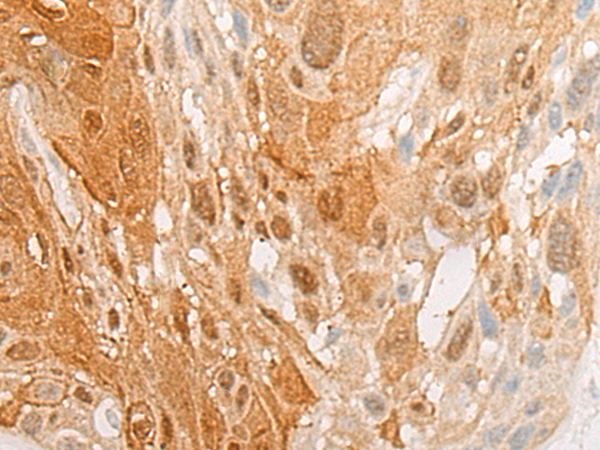
| WB | 咨询技术 | Human,Mouse,Rat |
| IF | 咨询技术 | Human,Mouse,Rat |
| IHC | 1/25-1/100 | Human,Mouse,Rat |
| ICC | 技术咨询 | Human,Mouse,Rat |
| FCM | 咨询技术 | Human,Mouse,Rat |
| Elisa | 1/5000-1/10000 | Human,Mouse,Rat |
| Aliases | UV20; COFS4; RAD10 |
| Host/Isotype | Rabbit IgG |
| Antibody Type | Primary antibody |
| Storage | Store at 4°C short term. Aliquot and store at -20°C long term. Avoid freeze/thaw cycles. |
| Species Reactivity | Human, Mouse |
| Immunogen | Synthetic peptide of human ERCC1 |
| Formulation | Purified antibody in PBS with 0.05% sodium azide and 50% glycerol. |
+ +
以下是3-4篇关于ERCC1抗体的参考文献及其摘要概括:
---
1. **标题**: *ERCC1 Expression and Outcome in Platinum-Based Chemotherapy for Non-Small-Cell Lung Cancer*
**作者**: Olaussen KA, et al. (2006)
**摘要**: 该研究通过免疫组化分析非小细胞肺癌(NSCLC)患者中ERCC1蛋白的表达,发现ERCC1低表达与铂类化疗的生存获益相关。研究指出所用抗体(克隆8F1)的特异性可能影响结果,但未深入验证抗体交叉反应性。
2. **标题**: *Comparative Evaluation of Antibodies for Immunohistochemical Detection of ERCC1 in NSCLC*
**作者**: Friboulet L, et al. (2013)
**摘要**: 研究对比了多种ERCC1抗体(如8F1、4F9)的特异性,发现部分抗体与无关蛋白(如PTM家族成员)存在交叉反应,导致临床预测结果不可靠,强调需验证抗体特异性以提高检测准确性。
3. **标题**: *ERCC1-Specific Antibodies Fail to Predict Ovarian Cancer Survival Post-Chemotherapy*
**作者**: Bhagwat NR, et al. (2009)
**摘要**: 该研究评估了两种ERCC1抗体(8F1和FL297)在卵巢癌组织中的表现,发现两者检测结果不一致,且与患者化疗反应无显著关联,提示抗体选择对生物标志物研究的重大影响。
4. **标题**: *Challenges in Developing Reliable ERCC1 Immunoassays*
**作者**: Simon GR, et al. (2005)
**摘要**: 研究探讨了ERCC1抗体在临床检测中的局限性,指出不同实验室使用相同抗体(如克隆8F1)时结果差异显著,呼吁标准化检测流程和抗体验证方法。
---
**核心结论**:这些文献普遍强调ERCC1抗体的特异性问题(如交叉反应、克隆差异)可能导致临床数据矛盾,需通过质谱或基因表达验证抗体可靠性。
ERCCl (Excision Repair Cross-Complementation Group 1) is a critical protein involved in DNA repair mechanisms, particularly in the nucleotide excision repair (NER) pathway. It forms a complex with XPF (ERCC4) to function as a structure-specific endonuclease, essential for removing DNA lesions caused by UV radiation, platinum-based chemotherapeutics, and other DNA-damaging agents. ERCC1’s role in maintaining genomic stability has made it a focus in cancer research, as its expression levels are linked to tumor response to chemotherapy and patient prognosis.
Antibodies targeting ERCC1 are widely used in research and clinical diagnostics to assess protein expression in tissues. These antibodies enable detection via immunohistochemistry (IHC), Western blotting, or immunofluorescence, helping correlate ERCC1 levels with therapeutic outcomes. For example, low ERCC1 expression in cancers like non-small cell lung cancer (NSCLC) or ovarian cancer is often associated with better sensitivity to platinum-based drugs (e.g., cisplatin, oxaliplatin), while high expression may indicate chemoresistance. This has spurred interest in ERCC1 as a predictive biomarker for personalized treatment strategies.
However, challenges persist in standardizing ERCC1 antibody assays due to variability in antibody specificity, epitope recognition, and scoring methods. Discrepancies in clinical studies highlight the need for rigorous validation of antibodies and harmonized protocols. Despite these issues, ERCC1 remains a pivotal target in understanding DNA repair dynamics and optimizing cancer therapies.
×